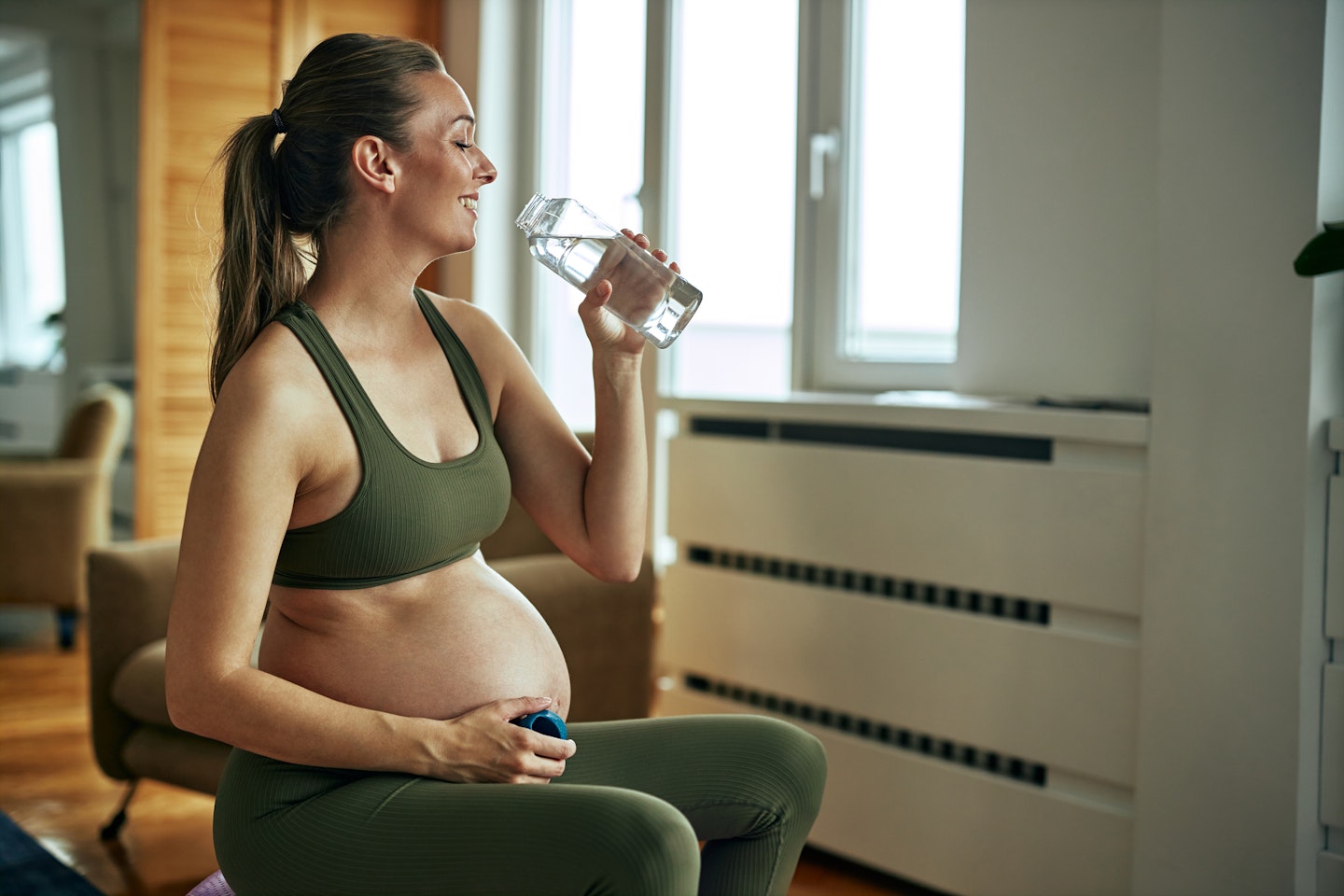Pregnancy is a time of incredible change. Your body is working overtime to nurture your growing baby, and amidst all the excitement and preparation, there's one essential aspect of your health that often flies under the radar: electrolytes. As a midwife with over a decade of experience guiding women through pregnancy, I've seen firsthand how important these tiny minerals can be for both you and your baby. So, let's dive into the world of electrolytes and discover why they matter so much during your pregnancy journey.
What are electrolytes, and why should you care?
Ever wondered why your midwife keeps talking about staying hydrated and eating a balanced diet? There's more to it than you might think. Beyond keeping you refreshed and nourished, it's about maintaining some crucial, yet often overlooked, elements in your body: electrolytes. These mighty molecules play a vital role in keeping you and your growing baby healthy throughout your pregnancy journey.
But what exactly are these essential elements? Electrolytes are minerals that, when mixed with the fluids in your body, can conduct electricity. Think of them as tiny, naturally occurring power sources floating around in your blood and other bodily fluids. These little dynamos include familiar names like sodium, potassium, calcium, and magnesium, along with a few others.
You might recognise many of these as minerals you've heard of before. There's also bicarbonate, which isn't a mineral but is equally important. Each of these has its own special role in supporting you and your pregnancy.

Now, why are these little powerhouses so important, especially when you're pregnant? Well, they're responsible for some pretty big jobs:
• Keeping your fluids balanced (crucial when you're retaining water!)
• Helping your muscles contract (think Braxton Hicks and labour)
• Ensuring your nerves function properly (which might help with coordination and could even play a role in managing that 'baby brain' feeling)
• Directing water to where your body needs it most (including your bladder, which helps flush out bacteria and reduce the risk of those pesky urinary tract infections that can be more common during pregnancy)
• Supporting your baby's brain and nervous system development
• Helping your baby's bones and teeth form properly
• Maintaining the right balance of amniotic fluid, which protects and supports your baby's growth
During pregnancy, your body goes through some major changes, and electrolytes help manage all that extra fluid you're carrying around. They're like little traffic controllers, making sure water goes where it's needed most in your body, and your baby's. They also play a vital role in helping nutrients cross the placenta to nourish your growing little one. Staying well-hydrated is crucial during pregnancy, a point emphasised not just by midwives like myself, but also by national health services.
Understanding these mighty molecules can help you make better choices about your diet and hydration throughout your pregnancy. But remember, if you ever have concerns about your electrolyte balance, your midwife or doctor is always the best person to chat with.
Your baby's lifeline: The placenta and electrolytes

Let's talk about one of the most amazing organs in the human body – the placenta. It's a baby's lifeline during pregnancy, ensuring they get all the oxygen and nutrients they need while getting rid of waste. And guess what plays a huge role in making sure the placenta does its job? You guessed it – electrolytes.
Proper electrolyte balance helps regulate blood flow through the placenta. This means the baby gets a steady supply of everything they need to grow and develop, especially when it comes to brain development. When electrolytes are in balance, the placenta functions like a well-oiled machine, the baby gets all the nutrients they need, and there's a reduced risk of developmental delays.
But if things get out of whack, it can disrupt the flow of nutrients to the baby. In some cases, it could lead to issues like intrauterine growth restriction, where the baby's growth is slower than expected. In severe cases, electrolyte imbalances might even cause complications during delivery.
Electrolytes through the trimesters: Your changing needs
As your pregnancy progresses, your electrolyte needs evolve. Let's take a journey through each trimester to understand what you might experience and how to keep your electrolyte balance in check.
First trimester: building the foundation
The early weeks of pregnancy are all about laying the groundwork for your baby's development. Your blood volume starts to increase, which means your electrolyte needs go up too. If you're dealing with morning sickness (and let's face it, many of us do), you might find your electrolyte balance thrown off kilter.
Keep an eye out for persistent headaches, nausea that goes beyond your typical morning sickness, or feelings of confusion or dizziness. These could be signs that your electrolytes need some attention.
To keep things balanced, focus on eating a varied diet rich in fruits and vegetables. If you're struggling to keep food down, don't worry - small, frequent meals can help. And if you're really struggling with sickness, chat with your midwife about whether an electrolyte supplement might be helpful. Just remember, when it comes to hydration, you're aiming for pale yellow urine - not clear (which could dilute your electrolytes) and not dark (which might mean you're dehydrated).
Second trimester: Growing and glowing
As you enter the second trimester, you might find yourself with a bit more energy - thank goodness! But your growing baby means your electrolyte needs are changing too. Calcium and magnesium become super important now for your little one's developing bones and muscles.
You might start experiencing leg cramps, especially at night. While these can be a normal part of pregnancy, they're often a sign that your magnesium or potassium levels need a boost. If you're feeling tingling sensations in your fingers or toes, that's another sign to pay attention to your electrolyte intake.
To keep up with these changing needs, try to incorporate more calcium-rich foods into your diet. Dairy products are great if you can tolerate them, but don't worry if you can't - leafy greens and fortified plant milks are excellent sources too. For magnesium, think nuts, seeds, and whole grains. If you're finding it hard to get enough through your diet alone, have a chat with your midwife about whether a supplement might be right for you.

Third trimester: The home stretch
As you approach the final weeks of pregnancy, managing your electrolyte balance becomes even more crucial. Your blood volume reaches its peak, and you might find yourself dealing with swelling, especially in your hands and feet.
Keep a close eye on any sudden increases in swelling or blood pressure - these could be signs of preeclampsia, a condition where electrolyte balance plays a significant role. It's always better to check with your midwife if you're concerned. I always recommend regular antenatal check-ups, which include monitoring blood pressure and urine tests - a practice endorsed by leading health organisations to catch any potential issues early.
At this stage, it's all about finding the right balance with your sodium intake. While you don't want to go overboard (too much can contribute to high blood pressure), you also don't want to restrict it too much. Focus on whole, unprocessed foods and let your taste buds be your guide.
Staying hydrated is still important, but be mindful not to overdo it. Too much water without enough electrolytes can lead to problems during labour. When you're resting, try elevating your feet - it can help manage swelling and improve circulation.
Labour day: Electrolytes take centre stage
When it comes to labour and delivery, electrolytes are the unsung heroes. They play an essential role in maintaining your energy levels during this marathon event, supporting effective uterine contractions, and helping prevent complications like prolonged labour.
Here's a heads up: drinking too much water during labour without replacing electrolytes can lead to a condition called hyponatremia. This can slow down your contractions and make labour longer. To avoid this, consider sipping on a sugar-free electrolyte drink during labour. It can help keep your energy up and support those all-important contractions.
But there's more to the story, especially if your labour needs a little help getting started. If you're being induced or your labour is being augmented, it's even more important to be aware of your electrolyte balance. Here's why:
• Induction of labour often involves the use of synthetic oxytocin (sometimes called Syntocinon or Pitocin). While this hormone is naturally produced by your body during labour, the synthetic version can affect your body's fluid and electrolyte balance.
• Oxytocin has an antidiuretic effect, which means it can make your body retain more water. This can potentially lead to a dilution of electrolytes in your blood, particularly sodium.
• The combination of oxytocin administration, IV drips and excessive water intake (which can happen if you're very thirsty during labour) increases the risk of developing hyponatremia.

So, what does this mean for you? If you're being induced or given oxytocin to strengthen your contractions, your midwife or doctor will be keeping an extra close eye on your fluid intake and output. They might suggest alternating between water and electrolyte drinks to help maintain balance.
Remember, every labour is different, and your healthcare team will tailor their approach to your specific needs. Don't hesitate to ask questions about your care plan, including how they're managing your hydration and electrolyte balance. Your body is doing amazing things, and understanding what's happening can help you feel more in control during this incredible experience.
The fourth trimester: Recovery and beyond
Congratulations, you've made it through labour! But don't forget about those electrolytes just yet. In the postpartum period, your body is recovering from the marathon of childbirth, and if you're breastfeeding, you need extra fluids and nutrients.
Keep an eye out for excessive thirst, fatigue beyond the usual new-mum tiredness, or muscle cramps. These could be signs that your electrolyte levels need attention. Keep up with a balanced diet rich in fruits, veggies, and whole grains, and stay hydrated, especially if you're breastfeeding. If you're feeling particularly drained, chat with your healthcare provider about whether an electrolyte supplement might be beneficial.
When to call your midwife
While most electrolyte imbalances can be managed with diet and lifestyle tweaks, sometimes you need to call in the professionals. Get in touch with your midwife or doctor immediately if you experience:
• Severe or persistent headaches
• Excessive swelling, especially if it comes on suddenly
• Confusion or dizziness
• Rapid heartbeat
• Severe muscle cramps or weakness
Remember, it's always better to be safe and reassured. Your healthcare team is there to support you, so don't hesitate to reach out if you're concerned.
Your pregnancy: Informed and empowered
Pregnancy is an incredible adventure, filled with joy, anticipation, and yes, a fair share of challenges. Understanding the role of electrolytes is just one piece of the puzzle in supporting a healthy pregnancy, but it's an important one.
As you navigate this transformative time, remember that knowledge is power. By staying informed about your body's needs, including the essential role of electrolytes, you're taking an active role in creating the best possible environment for your growing baby.
Every pregnancy is unique, and there's no one-size-fits-all approach. Trust your instincts, stay in tune with your body, and don't hesitate to reach out to your healthcare provider with any concerns or questions. While my advice aligns with respected national guidelines, remember that personalised care is key to addressing your individual needs.
Remember, knowledge about your changing body, including the role of electrolytes, can help you navigate the ups and downs of pregnancy with greater confidence.
Darcey Croft is an advanced clinical practice midwife, maternal mental health expert, and mother of four. With over a decade of hands-on experience, she specialises in maternal mental & infant health, trauma-informed care, and complex birth planning. Darcey is the founder of Isomum and Mothermind, innovative platforms supporting women through pregnancy and early parenthood.
